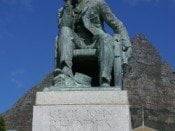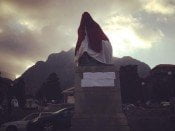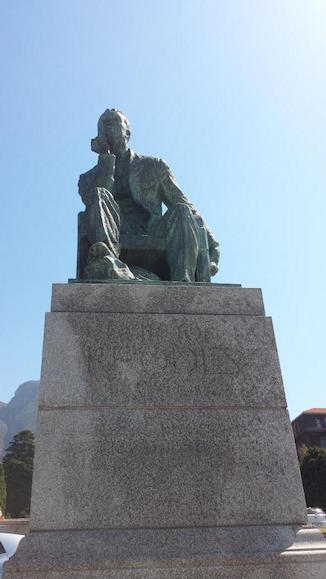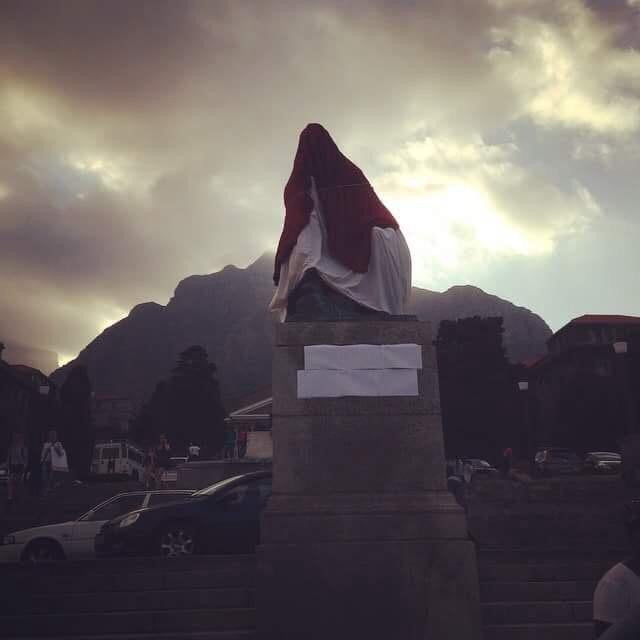Mcebo Dlamini is the current SRC President at Wits University, and also the current focus of much Twitter outrage, and even some conversation. Both the outrage and the conversation are due to this, from Facebook:
Responding to a commenter who wrote [about Israel] “Hitler new [sic] they were up to no good”, Dlamini replied “I love Adolf HITLER”.
 In the same comment thread, he claimed that all whites have a “bit of Hitler” in them. From what I’ve seen, the Facebook thread offered no context or explanation for these comments, the first of which is obviously offensive, in that it follows from a comment endorsing Hitler’s attitude towards “modern Israel”, and by extension Jews. In that context, Dlamini seems to be endorsing the Holocaust (even though I don’t believe he was in fact doing so).
In the same comment thread, he claimed that all whites have a “bit of Hitler” in them. From what I’ve seen, the Facebook thread offered no context or explanation for these comments, the first of which is obviously offensive, in that it follows from a comment endorsing Hitler’s attitude towards “modern Israel”, and by extension Jews. In that context, Dlamini seems to be endorsing the Holocaust (even though I don’t believe he was in fact doing so).
When asked to explain these comments, he said
What I love about Hitler is his charisma and his capabilities to organise people. We need more leaders of such calibre. I love Adolf Hitler.
He also responded to the news that his Facebook comment had been reported with “am not removing it…..truth hurts…face it murderers”. So, he respects certain attributes of Hitler, and summarises this in saying that he “loves” Hitler, and furthermore calls out supporters of modern-day Israel for inconsistency in that they (on his version) are “murderers” themselves.
There is no doubt in my mind that these comments are anti-Semitic, as the South African Union of Jewish Students noted. I think they were so in two ways: first, because of all the villians in history, Hitler occupies a unique position. There are still hundreds of thousands of people alive that he harmed fairly directly, in arranging for the killing of relatives and friends.
The vast majority of these folk are united in being Jewish, and it is that same fact about their relatives and friends that led to their deaths. Other villians like Genghis Khan, Pol Pot and Stalin are either not as fresh in the memory, or killed more randomly. My point is that there is no need to engage in any comparison regarding who was the most evil to recognise that Hitler’s evil is uniquely powerful in the visceral response it generates even today.
The second way in which they are anti-Semitic is that they draw an equivalence between modern-day Israel and the Holocaust. As much as I disapprove of much of Israel’s behaviour in Palestine and towards Palestinians, to describe it as being intended to result in Palestinian extermination seems an unfair comparison (even though quotes to that effect can be found, I don’t think them representative).
Having noted all the above, Dlamini should nevertheless be allowed to say these offensive and stupid things. He does not “love Hitler” for having killed millions of Jews, he simply loves controversy and headlines. Dlamini appreciates certain aspects of Hitler’s personality or certain skills (while perhaps being wrong or right about those same personality attributes and skills), and expressed this hyperbolically to get attention.
That’s fine. It’s is, in fact, good. Because now the Wits students know that they have a hothead anti-Semite as their SRC President, and they can remove him from office. They should remove him from office, as if they don’t, they are endorsing his views. But that’s as far as it should go – I don’t believe Dlamini did anything illegal, and I don’t believe that the university should pursue charges against him.
(I need to highlight one additional distinction with regard to charges, though: while I don’t think that the university should charge him in open court, it might well be possible that he contravened internal university rules. In fact, I think it’s almost certain that he did so, in that Wits would no doubt have rules about offensive speech and the like.
So even if Dlamini did not engage in hate speech as per the Bill of Rights, he should be charged with breaking an internal rule if he did so, or the rule should be changed. And this does not mean the internal rule is the right rule, or that I’m endorsing it. You either apply the rule, or you change it – but you don’t ignore it.)
That’s the first over-arching point I want to make: what he said was offensive and stupid, he should not be SRC President, but he should be allowed to say it. Then:
There’s a clear difference between “despite (positive) attribute X, Y is despicable” & “I admire (despicable) Y, for (positive) attribute X”
— Jacques Rousseau (@JacquesR) April 29, 2015
The second point I want to make is an extension of the Tweet above, and relates to sentiments of the sort expressed by T.O. Molefe in a Tweet calling out Max du Preez for inconsistent treatment of the RhodesMustFall situation and the one currently under discussion. The claim made was that du Preez is wrong in seeing Hitler as absolutely evil, while recognising both good and bad in Rhodes.
I think that’s a serious misreading of du Preez, in that I doubt he’d deny the fact of the matter if Hitler were, for example, often to be seen helping out at the old-age home. What I mean is that noting someone’s – anyone’s – positive virtues has no necessary bearing on one’s overall attitude towards them. Du Preez’ columns on Rhodes made their distaste for Rhodes clear upfront, before noting any virtues.
Even if you think it’s wrong to even note a single virtue of someone like Rhodes (or Hitler), there is nevertheless a clear difference between saying “that was an evil person, with one or two redeeming qualities” and saying “I love this person, even though he’s universally reviled for being a mass murderer of Jews”, and leaving it at that until being asked to clarify your sentiment.
Expressing your admiration or love for a person endorses them. Expressing the sentiment that they had certain virtues does not, or at least does so far more tentatively and ambiguously. The difference is clear, and we cannot make excuses for Dlamini as a result of how some responded to Rhodes, if the issue is restricted to this one alone, namely the “I love him” followed by a belated “but…” versus “he was a bad man, albeit with a few virtues”.
(As another aside, because I know how misreadings abound, I don’t think comparisons between Rhodes and Hitler are either useful or justified. My point is merely to make the case that there is no necessary equivalence between a sentiment about the one and a sentiment about the other. Both the words and the context of their utterance matters.)
Consider saying “I hate Hitler, but…” or saying “I love Hitler, although…” – both of those will be regarded as offensive by many, but hopefully you can see that they are less so than saying “I love Hitler” and then waiting for someone to ask what you mean. If you say “I love Hitler” without qualification, you’re saying something about your character, and loudly enough that the Wits students will probably hear it.
Lastly, I’d also encourage you to read this piece about Dlamini’s history, including his extended deception of peers where he claimed to be the love-child of Zwelakhe Sisulu and a Swazi princess, as well as a student in a secret nuclear physics degree at the University of Pretoria. He’s now admitted to lying about these things, but the story told there suggests to me that taking him too seriously would be a mistake, and also that we shouldn’t lose sight of the fact that a sympathetic ear might be more useful than shouting at him.
He expressed himself badly, yes, but that’s not always the same thing as being a bad person. Distinctions can, and should, be made.







